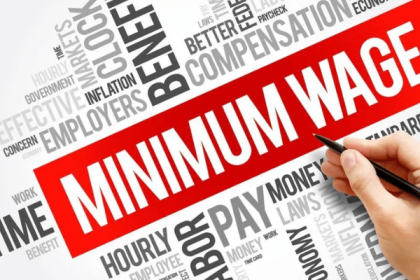
As the controversy over the minimum wage fades, worries about how much it will cost the federal, state, local, and organised private sectors continue to exist. The three levels of government should expand the tax base and enact business-friendly regulations for the private sector to prevent significant job losses, even as the states look for methods to raise their IGR in order to pay for capital expenditures and the new wage bill.
On Monday, President Bola Tinubu ratified the new minimum wage legislation. The law permits labour unions to renegotiate the wage every three years and sets a national minimum wage of N70,000 for workers.
But firms are paying a heavy price for the new wage regulation. To enable the Federal Government to make payments, the Senate authorised an additional N6.2 trillion in funding for the 2024 Appropriations Act. The increase is intended to facilitate deliberate infrastructure improvements as well. As a result, the budget was raised to N35.5 trillion from N28.7 trillion.
That being said, this suggests that the current budget deficit would rise, adding N3 trillion to the initial N10 trillion deficit. The minimum wage, which is dependent on the windfall tax on banks’ foreign exchange gains, would make debt servicing and unrestricted borrowing more difficult.
Nigeria paid off its debts with N7.8 trillion in 2023, a 121% rise from N3.52 trillion in 2022. The nation’s debt service might increase from N8.3 trillion in 2024 to N9.3 trillion in 2025 and N11.1 trillion in 2026, according to a PwC Nigeria research. This highlights Nigeria’s credit rating outlook and casts doubt on its capacity to pay off debt.
In order to win back public trust, the federal government must act quickly to reduce the cost of governance, combat insecurity, and make major infrastructure investments to draw foreign direct investment.
Regretfully, things are not well at the government. The removal of petrol subsidies and the floating of the naira have had unfavourable effects on the economy. The government has no option but to raise the minimum wage by 133% due to the combination of rising inflation and the high expense of living. Even while workers are expecting more than twice their earnings, inflation—which is currently at 34.19 percent—remains an uncontrollable beast.
As the controversy over the minimum wage fades, worries about how much it will cost the federal, state, local, and organised private sectors continue to exist. The three levels of government should expand the tax base and enact business-friendly regulations for the private sector to prevent significant job losses, even as the states look for methods to raise their IGR in order to pay for capital expenditures and the new wage bill.
On Monday, President Bola Tinubu ratified the new minimum wage legislation. The law permits labour unions to renegotiate the wage every three years and sets a national minimum wage of N70,000 for workers.
But firms are paying a heavy price for the new wage regulation. To enable the Federal Government to make payments, the Senate authorised an additional N6.2 trillion in funding for the 2024 Appropriations Act. The increase is intended to facilitate deliberate infrastructure improvements as well. As a result, the budget was raised to N35.5 trillion from N28.7 trillion.
That being said, this suggests that the current budget deficit would rise, adding N3 trillion to the initial N10 trillion deficit. The minimum wage, which is dependent on the windfall tax on banks’ foreign exchange gains, would make debt servicing and unrestricted borrowing more difficult.
Nigeria paid off its debts with N7.8 trillion in 2023, a 121% rise from N3.52 trillion in 2022. The nation’s debt service might increase from N8.3 trillion in 2024 to N9.3 trillion in 2025 and N11.1 trillion in 2026, according to a PwC Nigeria research. This highlights Nigeria’s credit rating outlook and casts doubt on its capacity to pay off debt.
In order to win back public trust, the federal government must act quickly to reduce the cost of governance, combat insecurity, and make major infrastructure investments to draw foreign direct investment.
Regretfully, things are not well at the government. The removal of petrol subsidies and the floating of the naira have had unfavourable effects on the economy. The government has no option but to raise the minimum wage by 133% due to the combination of rising inflation and the high expense of living. Even while workers are expecting more than twice their earnings, inflation—which is currently at 34.19 percent—remains an uncontrollable beast.
Sustainability is still a big problem as a result. There is a rising fear that states might not make payments. A history of nations not paying their predecessors faithfully supports the doubt.
Since the Muhammadu Buhari administration signed the N30,000 minimum wage into law in 2019, 15 states have not yet implemented it, according to BudgIT. The civic tech NGO reported that each state’s IGR-to-GDP ratio was 1.01 percent in its 2023 States of States Report. According to it, the IGR decreased in 17 states in 2022. A large number of states are unprofitable. A new minimum rule would force many states into insolvency, according to BudgIT.
In the Goodluck Jonathan administration, N18,000 was the minimum salary. State governors put pressure on the federal government to manipulate the Excess Crude Account in order to make payments.
States must function as strong economic entities in order to prevent this. They ought to look for ways to increase their IGRs, get rid of fripperies and white elephants, and concentrate on important development initiatives. Agriculture should be given priority. Monitoring capital expenditures is necessary to ensure their proper implementation.
The private sector continues to face poor business conditions. Numerous issues plague manufacturing, chief among them being high energy costs, a poor population, and inadequate infrastructure. Businesses may decide to rightsize their workforce in response to the increase in the minimum wage. The private sector should receive incentives from the government.

